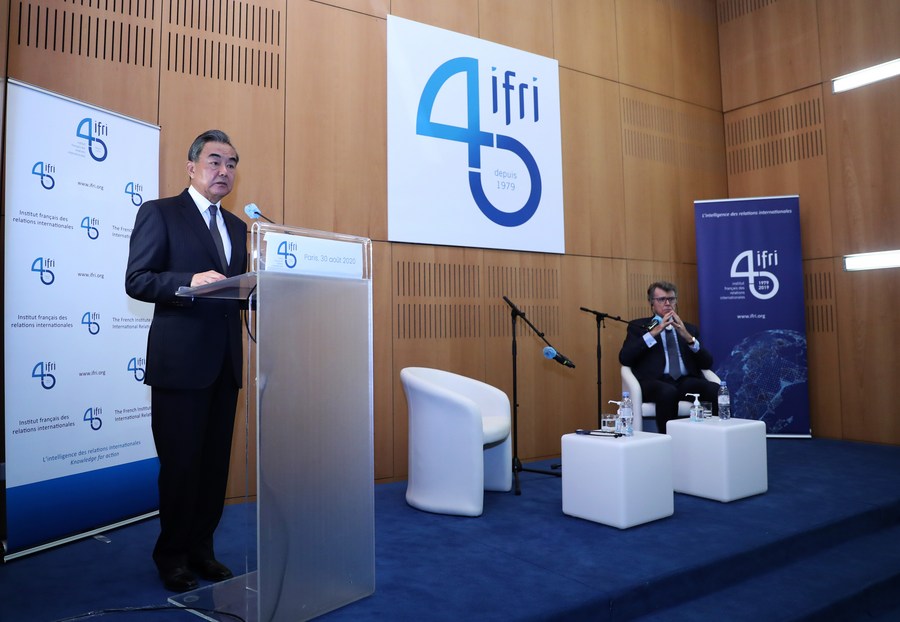What kind of message did Wang Yi's European tour send?
- By George N. Tzogopoulos
 0 Comment(s)
0 Comment(s) Print
Print E-mail China.org.cn, September 2, 2020
E-mail China.org.cn, September 2, 2020

We are living in a world filled with uncertainties, where the lack of international cooperation during the COVID-19 pandemic has not been a theoretical fear but a tangible reality.
Politicization of issues of public health has not only undermined the global fight against the virus, but caused further anxiety around the world. The withdrawal of the U.S. from the World Health Organization was a characteristic example, at a critical juncture. However, the desideratum remains for multilateralism to stay the course.
China and Europe joined hands during the pandemic and attempted to find common ground against a huge threat to public health. This does not mean there aren't marked disagreements.
At some time, for example, EU High Representative Josep Borrell talked about a global battle of narratives. What matters more in today's world is not to cultivate illusions about agreements on all issues among partners, but to forge a good understanding and mutual trust that allows collaboration.
The European tour of Wang Yi occurred in this framework. China's State Councilor and Foreign Minister visited four EU member-states, Italy, France, Germany and the Netherlands, and one non-EU member-state, Norway, in his first overseas trip after the outbreak of the pandemic.
The Chinese government aims at forging closer ties with European countries at the bilateral level as well as with the EU on the whole. These ties could and should be of a multifaceted nature.
The first priority is the continuous fight against COVID-19. While China has already brought the virus under control, many European countries are struggling to contain the second wave.
Complacency over the level of control of the existing peril before tackling new outbreaks, will further complicate the problem. COVID-19 respects no borders and this is what the experience of the first semester of 2020 suggests.

In a speech Wang Yi gave in Paris, he also talked about the necessity to "strengthen cooperation in the research, development and production of vaccines, drugs and testing reagents."
A branch of the Chinese company FOSUN, for example, has already agreed to deliver 10 million of doses of its German partner's BioNtech potential vaccine to Hong Kong and Macao. In August, the two companies announced the start of trials in line with a strategic development agreement they had signed in March. This is an example of the required collective effort at the private level.
Coordination against COVID-19 starts with public health concerns and expands to economic considerations. China is ahead because it entered recession in the first quarter and returned to growth in the second.
Other countries followed chronologically. The economy of Norway, for instance, suffered a 6.3% contraction in the second quarter, but it rebounded in June as it grew 3.7% in comparison to May. The question is how people-to-people exchanges will return to normalcy with mutually-acceptable hygiene protocols, and whether trade can reach pre-COVID-19 levels.
The recovery of the European economy is significant for China. Wang Yi publicly welcomed the EU recovery fund, a forward-looking initiative that opens for the first time the door for the issuance of common debt – notwithstanding the narrow nature of this issuance.
Of course, difficult discussions are expected on the China-EU Investment Agreement in a period during which Chinese FDI in Europe has already taken a downward trend, partly as a result of the so-called screening mechanism.

Additionally, the visit of Wang Yi in Oslo intensifies efforts for the conclusion of a free trade deal between China and Norway, possibly by the end of the year.
China and the EU countries he visited have different political systems and often see developments from other lenses. This became evident in some of the press conferences given in the last days. Nevertheless, this reality should not hinder their commitment to responding together to global challenges.
Perhaps the best news came from the German foreign minister in Berlin after his meeting with his Chinese counterpart that a decoupling of the relationship between the EU and China would not be in Brussels' interest. This is a clear indication of further advancing the concept of strategic autonomy.
In an uncertain world, Europe's commitment to multilateralism is good for stability and acknowledges China's growing role. Obviously, not all European countries, whether member-states of the EU or not, agree, and sometimes they chart their own foreign policies. But it is the general tendency and most important message of Wang Yi's meetings.
George N. Tzogopoulos is a columnist with China.org.cn. For more information please visit:
http://m.formacion-profesional-a-distancia.com/opinion/GeorgeNTzogopoulos.htm
Opinion articles reflect the views of their authors, not necessarily those of China.org.cn.
If you would like to contribute, please contact us at opinion@china.org.cn.





